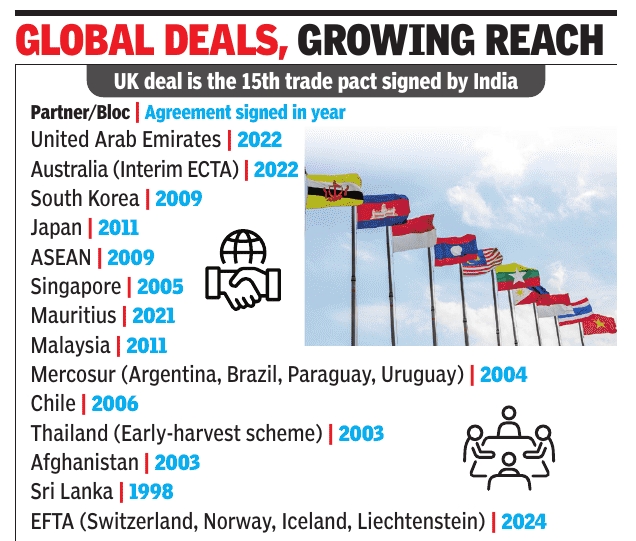Free trade agreements and India
This is a collection of articles archived for the excellence of their content. |
A chronology
1998 – 2024; 2025
Sidhartha, July 25, 2025: The Times of India

From: Sidhartha, July 25, 2025: The Times of India
New Delhi : The India-UK free trade agreement will take at least a year to be implemented, but it sets the template for some of the high-stakes negotiations that New Delhi is currently engaged in. With India agreeing to cut the duty on imported automobiles — at least the high-end ones — to 10% over the next few years, a similar offer is likely to be made for cars imported from EU member nations such as France, Germany and Italy. It also sets the tone for the bilateral trade deal with the US, as 10% will act as a floor of sorts.
The Economic Cooperation and Trade Agreement with Australia set the tone for allowing lower duty import of wines and spirits, something that was a taboo until three years ago. Or take the treaty with the UAE, which opened govt procurement for the first time. It paved the way for a similar deal with the UK.
In agriculture, govt officials are citing the UK, European Free Trade Association (comprising Switzerland and Norway) and Australia deals to block American President Donald Trump from opening the Indian market to US dairy, maize and soybean. India has so far managed to convince its trade partners that it cannot risk the livelihood of millions of low-income farmers, given the large farms in the developed world. The same argument is being made to New Zealand, a competitive dairy exporter, as well as to EU. While pushing for the final deal with India, Australia, too, had made fresh overtures for dairy.
In trade negotiations, every deal is unique, but what has been opened becomes a floor for future talks. What the other trading partner offers is also critical.
The new FTAs India is signing may impact older ones. India, which wants ASEAN members, Japan and South Korea to review existing trade deals, may face fresh demands. Japan, South Korea and Thailand may seek parity on automobile tariffs under the revised pacts. India has over a dozen trade agreements, and each partner is closely watching the new ones in the pipeline.